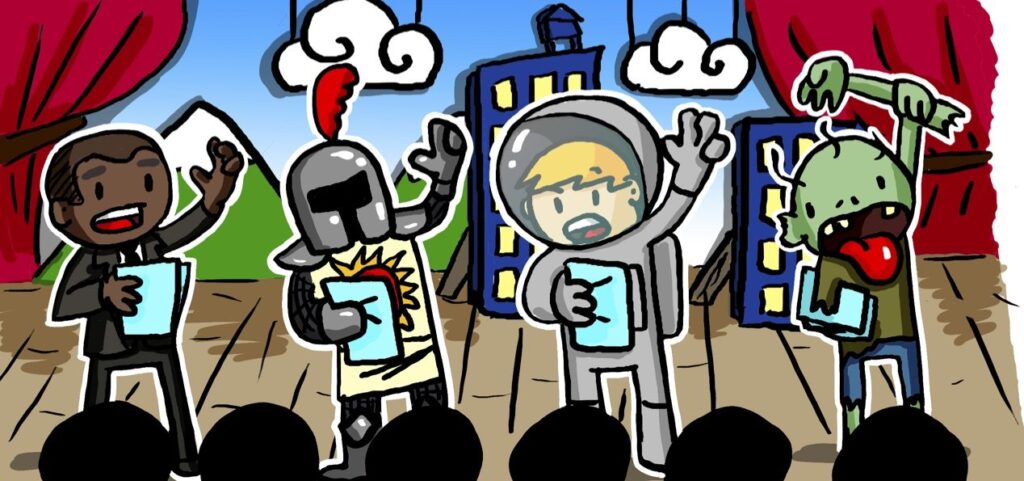
The following is an excerpt, reprinted with permission, from The GameDev Budgeting Handbook, written by Mike Futter and published by Bithell Games.
There are two primary ways to work with a writer on your game. They can either be a lead or an asset creator. Walt Williams (Spec Ops: The Line, Star Wars Battlefront II) draws the distinction in terms of stakeholders.
“A project lead is the main narrative stakeholder,” Williams says. “They work with the other leads to craft a narrative that best serves the project. They ensure art and design support that narrative through regular review, feedback, and working one-on-one with the other disciplines. They also write the script – or at the least, oversee a team of writers.”
Writers can also be tasked with “asset creation.” In this case, the writer is preparing dialog and incidental lines within the scope of someone else’s narrative vision. Within that broad label are a number of different roles:
“On Rise of the Tomb Raider, I worked a lot on the cinematics, and some other secondary narratives,” explains Rhianna Pratchett (Tomb Raider, Rise of the Tomb Raider). “They had another writer that was doing level dialog, and another that was doing documents, and then another that was helping polish.”

Bringing an additional writer closer to the end of development doesn’t necessarily mean your project is in trouble. When everything is going well, that person is simply a fresh pair of eyes that can help clean and polish before launch.
“Phillip Gelatt, who was our fresh pair of eyes on Rise of the Tomb Raider, he slotted in very well,” Pratchett says. “He knew that his role was to enhance and support what we had already done. His job wasn’t to rewrite everything, but to try and support the vision that had already been established and just be honest, but also diplomatic as well. And he was very good at that.”
The other occasion for bringing a writer on late in the project is for emergency script repair. Sometimes your initial writer doesn’t work out or needs assistance to bring the story across the finish line.
“I’ve talked about being contacted very late in a project. That’s what I call being a narrative paramedic,” Pratchett explains. “Avoid situations where you end up looking for a narrative paramedic. So your story is dying and you are desperate for someone to come in and save it. And it’s usually dying because you haven’t had writers or designers in the mix. Or maybe you have, and they haven’t worked out… certainly that happened a lot when the industry got very obsessed with Hollywood writers. That’s still there to a certain degree. And often the Hollywood writers didn’t really know what they were writing for, and the developers didn’t really know how to talk to the writers.
“And so what you would end up with might be an interesting script for a movie, but didn’t really work for a game, because those strong communication loops weren’t in place. That used to generate a lot of work for game writers having to narrative paramedic those kind of scripts.”
That’s not to say that you shouldn’t seek emergency writing help if you need it. It’s more about approaching writers transparently so they know what to expect.
“If it is a narrative paramedic gig, be honest and be direct about it,” Pratchett advises. “Don’t kind of dance around it. There’s obviously writers that will take those kind of gigs, that see that as a challenge. You want to try and engage a writer as early on as possible.”
Once you start working with larger budgets, you might decide to work with a writing team. Tomb Raider (2013) had two writers (Pratchett and John Stafford). That expanded to four people for the sequel, Rise of the Tomb Raider.
“Even then, with AAA games, that’s a fairly small to average writing team size these days,” explains Pratchett. “And when you’re talking about the AAA echelons, like teams for Ubisoft’s games, or The Witcher, or things like that… they’re massive compared to us.”
This isn’t to say that a single writer can’t carry a full game from start to finish. Pratchett tackled both Triumph Studios’ Overlord and Overlord II as a solo writer.
She also urges developers not to be dissuaded from approaching a writer because of budget concerns. There are numerous ways to involve a writer, including consultancies aimed at providing feedback on narrative direction.
“Don’t assume that because a writer has worked on AAA that they won’t work on an indie game,” Pratchett recommends. “I had some of my best experiences working on the Overlord games with Triumph Studios. It never hurts to ask. Especially if you think the writer would be well suited to your game. Also consider using writers for consultancy purposes. It can be a good way of milking their creative juices, without committing too much budget.”
The GameDev Budgeting Handbook, published by Bithell Games, is available on…
You can also purchase Michael Futter’s first book, The GameDev Business Handbook, on Gumroad and Amazon as an ebook or in hardcover.
Full disclosure: Mike Futter is Amanda Farough’s (Managing Editor of GameDaily.biz) partner
 GameDaily.biz © 2025 | All Rights Reserved.
GameDaily.biz © 2025 | All Rights Reserved.